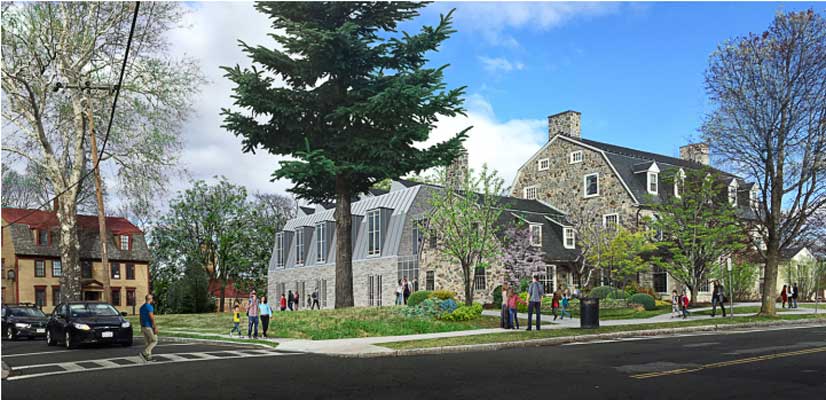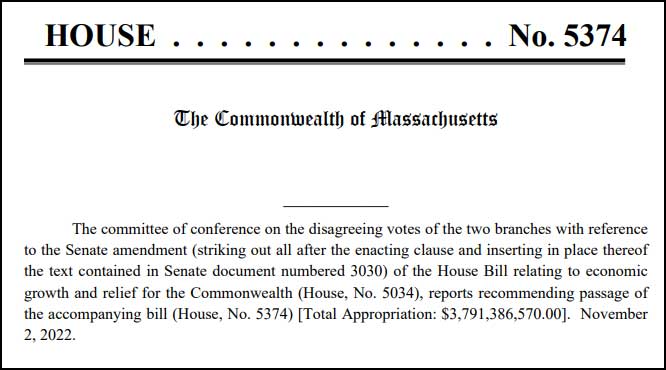Historical Commission Ponders Former Library Trustee Letter. MBLC Nets Small Gain In New Bill

Photo: https://www.joneslibrary.org/
Jones Library News Highlights For The Week Of October 31, 2022
Sarah McKee Letter Pursues Legally Mandated Review Of Library Project Historic Impacts
In early October Sarah McKee, a career attorney and former President of the Jones Library Board of Trustees, wrote to the directors of the Massachusetts Historical Commission (MHC) and the Massachusetts Board of Library Commissioners (MBLC) asking that they direct the town to comply with state Historic Preservation Law by forwarding documentation describing how the Jones renovation-expansion project will impact the state and nationally-registered historic building. These documents were requested by the MHC back in December 2016 following the Library’s submission of a Project Notification Form as required by the grant application process.
McKee cites state law that obligates the town to provide information “which affords the Massachusetts Historical Commission the opportunity to review and comment as early as possible in the planning stages of the project.” She points out 950 CMR 71.11 which declares that a historic building project that fails to inform the MHC jeopardizes its state grant funding.
McKee notes that the current Library Building Project Schedule shows that the Schematic Design phase when major construction work is identified was completed in July 2022.
Receiving a copy of the letter was Jane Wald who recently completed her term as Chair of the Amherst Historical Commission (AHC). The AHC has been entrusted with enforcing the Historic Preservation Restriction Agreement between the town and The Jones Library Trustees. Wald shared the correspondence with current AHC Chair Jan Marquardt who brought it up at the October 12 AHC meeting.
Marquardt described McKee as a “former Director of the Library [sic] who is part of a group that has been trying to stop the renovation as long as I have been on the commission.”
In Marquardt’s view, “the plan for the library has not fully gelled yet and so it’s been too early to actually convey that information.” She attributed the six-year delay in fulfilling the MHC request to COVID and “partly because [McKee’s] group made the Town Council take a re-vote.”
Marquardt acknowledged that the AHC is responsible for seeing that the terms of the Historic Preservation Restriction are followed and pledged to confer with Town Manager Paul Bockelman and Library representatives to develop a timeline of events that need to happen to provide the materials required by the MHC.
AHC member Robin Fordham expressed worry that McKee’s letter may be raising undue concern among the public and called for a measured response explaining that the process is moving along appropriately and “we’re here to assure you that we’re doing all those things.” Ben Breger of the Amherst Planning Department added that the project architects were ready to submit their plans in August but have been waylaid by the need to make design changes to reduce a growing budget gap. He now expects them to be ready in January.
Among the objections that McKee has voiced is the fact that nowhere on the Jones Library Building Project Schedule does there appear the task of preparing and vetting design documents with the state Historic Commission.
Mass. Legislature Passes Economic Development Bill With Small Earmark For Libraries
The Massachusetts House and Senate have approved and sent to Governor Charlie Baker’s desk a long-delayed $3.8 billion Economic Development Bill which closes out the FY22 state budget.
The bill includes an $840 million spenddown of FY22 surplus revenues that is one source of funds that Amherst Town Council had asked for a share of to close the $13.6 million budget gap facing the Jones Library renovation-expansion project. The request had been advanced by an alliance of 12 financially challenged library projects in collaboration with the Massachusetts Board of Library Commissioners (MBLC) that had awarded them construction grants now grossly insufficient due to rising costs.
[See related Councilors Double Down On Library Funding While School (And Taxpayers) Left Out In The Cold]
The bill, known as H.5374, reserves large sums for public health, clean energy initiatives, affordable housing and MBTA safety. It also includes individual library appropriations as high as $388,000 for heat pumps in the Hudson Public Library. However, surplus funds allocated to the MBLC as a whole totaled only $89,500.
State tax relief originally built into the Economic Development Bill was dropped from the final piece of legislation. Taxpayers are expected to benefit from Chapter 62F refund checks that will begin being mailed out this month.
The 12 libraries are still hoping to benefit from a cut of the $1.75 billion in unspent American Rescue Plan Act (ARPA) funds to be disbursed next year. They have appealed for an $87.7 million ARPA earmark.


In reference to the Jones library Oct 31 news highlights, it is ironic that J. Marquardt characterizes S. McKee as intent on stopping the library’s ‘renovation’ by pointing out that necessary documentation is missing, omission of which could very well torpedo state funding. One might think S. Mckee deserves a thank-you for alerting the relevant planners to this fault before it is too late to correct.
One might also think it appropriate for the Amherst Historical Commission (AHC) to evaluate the Jones Library’s demolition/construction designs now, instead of next year, for their adherence to the Historic Preservation Restriction Agreement on the Library’s exterior that the Library Trustees signed in 2017. It is the AHC’s responsibility to enforce that Restriction Agreement.
The AHC might want to pay particular attention to the Plexiglas-like “canopy” to be installed over the Jones Library’s historic Connecticut Valley split-pedimented Main Entrance. This “canopy” has been part of the project’s design since 2016. It is visible as an oblong, divided into 6 smaller oblongs, over the Main Entrance. See Slide 3, labelled G003, and Slide 10, labelled S103, of the schematic designs dated 1 July 2022. https://www.joneslibrary.org/DocumentCenter/View/8344/Schematic-Designs—Finegold-Alexander-July-1-2022-PDF.
This “canopy” is not only in-your-face ahistorical. It will provide markedly less protection from thunderstorms and similar elements than does the original roof over the East (accessible) Entrance. Yet the demolition/construction plans call for all patrons, including those using wheelchairs, walkers, canes, and crutches, to go in and come out routinely by the Main Entrance only.
Have the Trustees asked Amherst’s Disability Access Advisory Committee, or the Stavros Center for Independent Living, to weigh in on this reduced protection for those needing reasonable accommodation? If ever the Trustees did so, I am unaware of it.
Is the Amherst Historical Commission empowered to act based on the perceived intentions of critics? or should it evaluate the critics’ statements for fact and applicability?